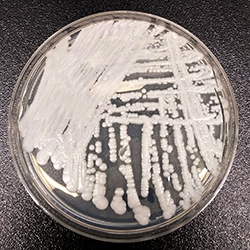By IDSE News Staff
A new study shows that genetic testing could be used to determine which drugs would be effective for patients with Candida auris. These findings could improve treatment for multidrug-resistant (MDR) C. auris infections by allowing physicians to prescribe appropriate antifungal agents sooner (Clin Chem 2025;71[1]:185-191 https://doi.org/10.1093/clinchem/hvae185).

Since C. auris was identified in 2009, this pathogenic fungus has spread worldwide, causing severe illness in patients in healthcare facilities. The estimated mortality rate ranges from 30% to 60%, and it is challenging to treat because there are many different strains of MDR C. auris, each of which has a different genetic profile that confers resistance to various antifungal drugs.
Clinical labs use susceptibility testing to determine whether a specific strain of C. auris is resistant to a particular drug. This involves growing a sample of a patient’s C. auris in the presence of different antifungal agents and waiting to see which drug kills the fungus. However, it can be difficult to interpret C. auris susceptibility test results because minimum inhibitory concentration breakpoints have not been fully established.
Altogether, this means that healthcare professionals might waste precious time trying to figure out which antifungal drug will clear a patient’s infection, the researchers said.
To improve testing for C. auris drug resistance, a team of researchers led by Marie C. Smithgall, MD, an assistant professor of pathology and cell biology at Columbia University Irving Medical Center, in New York City, examined antifungal resistance genes in samples of C. auris isolated from 66 patients at the researchers’ institute. The samples underwent two types of genetic testing—whole-genome sequencing (WGS) and Sanger sequencing—which were used to identify each sample’s genetic fingerprint. The samples also underwent traditional susceptibility testing and were grown in the presence of seven major antifungal drugs.
By comparing the genomic and susceptibility test results, the researchers confirmed that a number of different mutations in the strain’s FKS1 gene cause resistance to echinocandins, which are the class of antifungal drugs considered first-line treatment for invasive C. auris infections. Specifically, the researchers showed that:
- the Ser639Tyr FKS1 mutation and Arg135Ser mutation are associated with resistance to the antifungal drugs micafungin and anidulafungin; and
- the Met690Ile mutation is associated with resistance to caspofungin.
“With potential resistance to all three major antifungal classes of drugs, C. auris is an emerging public health threat. Early detection of echinocandin resistance by molecular methods could impact treatment course to include novel antifungal agents,” Dr. Smithgall said. “Overall, WGS serves as a powerful tool for molecular surveillance to help monitor, detect and curb the spread of C. auris.”
{RELATED-HORIZONTAL}